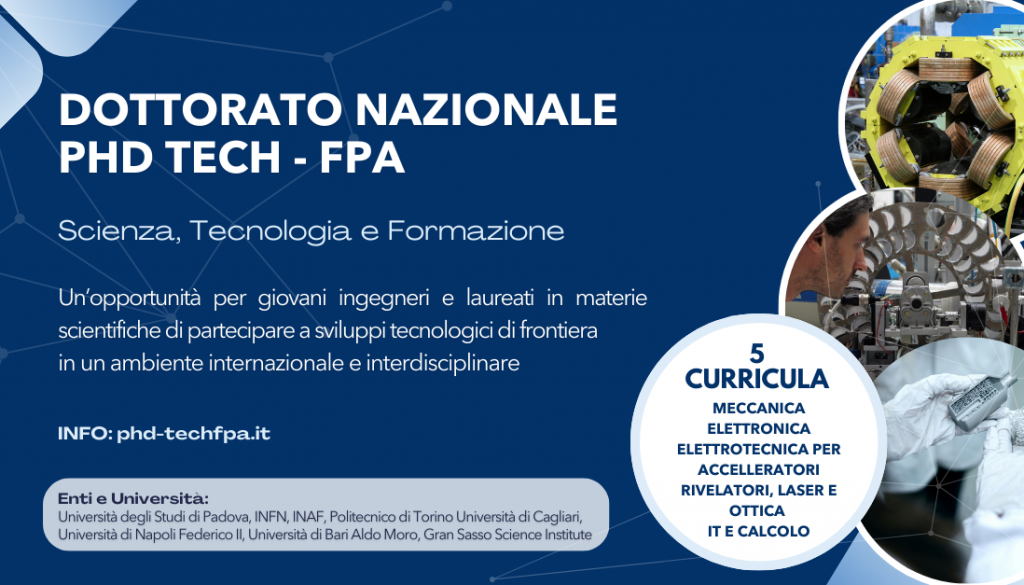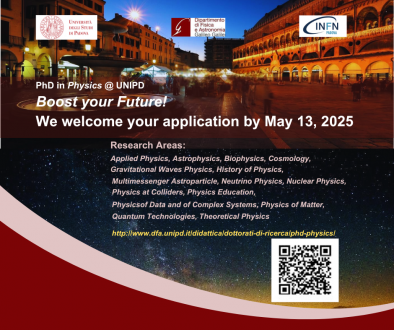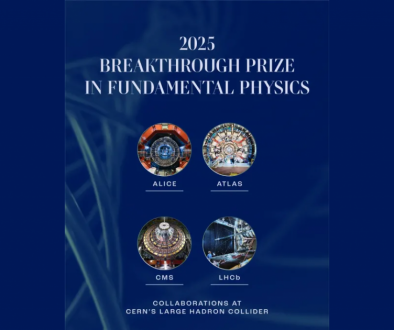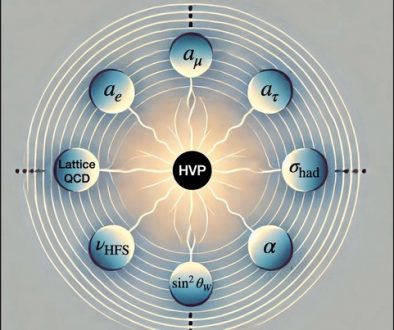PhD Program of National Interest in Technologies for fundamental research in Physics and Astrophysics – deadline: 25th July 2024
The University of Padua, in collaboration with ten other universities, with the National Institute for Nuclear Physics and National Insitute for Astrophysics, proposes a national PhD Programme in Technologies for fundamental research in Physics and Astrophysics, a study track with strong multidisciplinary features, aiming to develop technological and engineering expertise and skills that are essential for fundamental research in Physics and Astrophysics.
The training programme is based on the development of a research project, original and relevant for the progress of knowledge in the field of Technologies for fundamental research in Physics and Astrophysics. The research project will be based on one of the five available curricula of the PhD course.
It will also provide the PhD students with a set of tools and skills that will allow them to play a leading role in the field of cutting-edge technologies used in both public and private research and in the transfer of these technologies towards the national production chain.
The PhD course is divided into five curricula, spanning all thematic aspects of Technologies for fundamental research in Physics and Astrophysics:
- Mechanics focuses on the use and development of advanced methodologies and technologies in the fields of additive manufacturing, materials, cryogenics, ultra-high vacuum, metrology, mechatronics and multi-physics simulations and analyses.
- Elecronics centres on analogic a digital micro-electronics for detector read-out, networks of sensors and detectors, electrodynamics, magnetism, radiation resistant electronics, radio frequency electronics for detectors, power electronics for detectors, electronics for control systems, diagnostics and safety of accelerators and detectors, radio communication systems.
- Computing and information technology is about the implementation of computing technologies and networks, supercomputing methods and applications, Big Data, storage and the use of AI.
- Detectors, Lasers and Optics reunites the technologies for radiation detectors, for optical, infrared and high energy detectors, as well as laser, optical and optomechanical technologies.
- Electrotechnics and electrotechnics for accelerators focuses on technologies applied to the creation of extremely intense electromagnetic fields for accelerators, which include electromagnets, radiofrequency cavities and transmission systems, operating in particular in a regime of superconductivity, permanent magnets and high-performance power systems
32 scholarships are available.
Deadline
July 25th 2024
INFN scholarships
INFN – Sezione di Padova
CURRICULUM: Electronics
TOPIC: Study of Methods for Low Phase Noise Timing Distribution in Astrophysics Experiments
INFN – Sezione di Torino
CURRICULUM: Detectors, Lasers and Optics
TOPIC: Development and Characterisation of the Small-Sized Telescope camera for the Cherenkov Telescope Array (CTA)
INFN – Sezione di Ferrara
CURRICULUM: Electronics
TOPIC: Upgrade of the DAQ system of the LHCb Ring Imaging Cherenkov (RICH) detectors for operation at High-Luminosity LHC (HL-LHC) conditions
INFN – Sezione di Cagliari
CURRICULUM: Detectors, Lasers and Optics
TOPIC: Development of an innovative phase-camera for the Einstein Telescope Interferometer
INFN- Sezione di Cagliari
CURRICULUM: Detectors, Lasers and Optics
TOPIC: Development of innovative techniques for background reduction in cryogenic liquid noble-gases detectors
INFN – Sezione di Napoli
CURRICULUM: Mechanics
TOPIC: Development of mechanical technologies for vibration insulation in gravitational wave detectors and other fundamental physics experiments
INFN – Sezione di Perugia
CURRICULUM: Detectors, Lasers and Optics
TOPIC: Development of solid-state detectors for clinical beam dosimetry, both conventional and FLASH
INFN – Sezione di Lecce
CURRICULUM: Computing and information technology
TOPIC: Optimizing Machine Learning Architectures for Enhanced Event Reconstruction and Calibration in Fundamental Physics Experiments
INFN – Laboratori Nazionali di Legnaro
CURRICULUM: Mechanics
TOPIC: Development, design and testing of metallic components for high-temperature nuclear physics applications produced using additive manufacturing technologies
INFN – Sezione di Bari
CURRICULUM: Electronics
TOPIC: Development and test of a readout system for a pixel detector with multi- Gbps interface
INFN – Sezione di Roma Tor
Vergata
CURRICULUM: Computing and information technology
TOPIC: Development of databases and archiving systems for real-time monitoring of scientific data for astroparticle physics missions
INFN – Sezione di Roma Tre
CURRICULUM: Electronics
TOPIC: Advanced acquisition system for hadrontherapy




